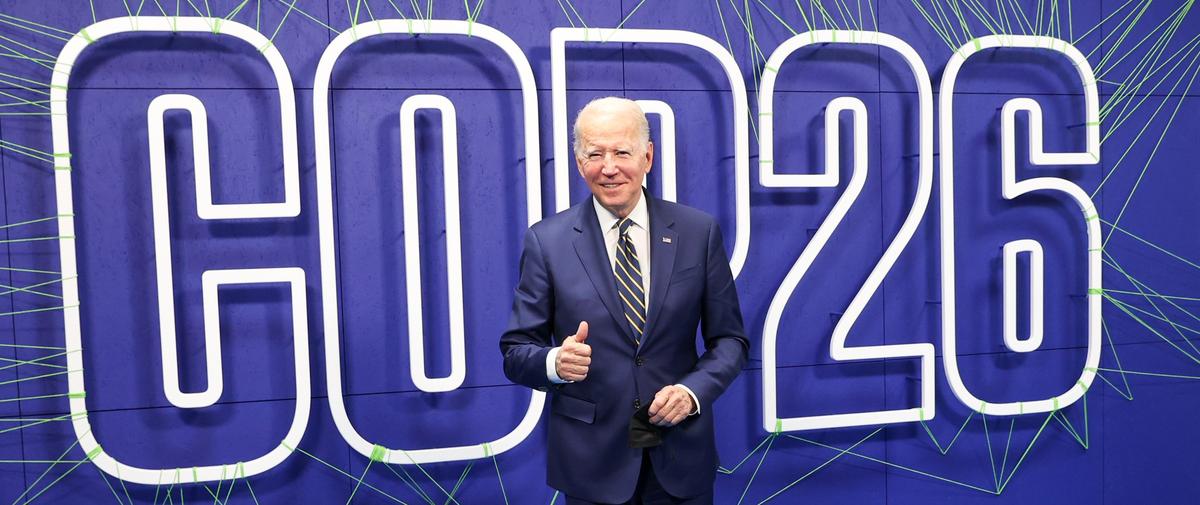
The Conference of Parties 26 UN Climate Change Summit, or COP26 as it is more widely known, ran from Oct. 31 until Nov. 12 in Glasgow, and I was honored to attend on behalf of EnviroVoters. The conference concluded with The Glasgow Climate Pact signed by over 200 countries, keeping the possibility of limiting global warming to 1.5 degrees alive. The agreement builds on progress made throughout the event on commitments by nations on curbing deforestation, reducing methane emissions, and accelerating the transition to carbon-free energy.
This progress, however, is not enough. Scientists say the world is still on track for 2.4 degrees Celsius of warming — an outcome that would wipe out several low-lying nations in the Global South and many indigenous communities. And even if we are able to limit warming, coastal nations would still see untenable increases in sea level rise and extreme weather. The latest 2030 plans under the Paris Agreement framework — known as Nationally Determined Contributions (NDCs) — still don’t go far enough and The UN Environment Program concluded that the new NDCs and net-zero pledges made during COP26 would only have an incremental effect on the gap between projected emissions and a climate-safe future.
The most evident injustice at COP26 was that some of the most climate-vulnerable people from Island nations most at climate risk were underrepresented at this year’s historic summit due to prohibitive costs, visa and accreditation issues, lack of vaccine access, and COVID-19 restrictions. Only three out of 14 threatened Pacific Island state were able to send delegates. The comparison highlights a profound injustice for vulnerable countries, which did very little to cause climate change and yet bear the brunt of its consequences.
Despite these disappointments, I felt there was collaboration and a shared language between government, the private sector, youth, media, entrepreneurs, and activists. The message was clear: This may be our last best decade to stop catastrophic climate change and achieve a sustainable future for all and not just the few. The urgency of change needed was echoed by all.
Here were my top learnings and thoughts:
- Raise ambition to close the gap between the Global North (traditionally the nations that have achieved more industrialization and used fossil fuels more in the previous decades) and the Global South (nations still developing but also facing the consequences of climate change right now as a direct result of excessive use of fossil fuels by the Global North). We have to lay out the long-term road and give people confidence that we will use this decade as THE decade for decision and action in order to make everything else possible. Why? Because scientists have made it clear: If we don’t reduce enough between 2020 and 2030, we can’t keep 1.5 degrees alive and therefore we lose the prospect of going net zero by 2050.
- Finance. No government has enough money to fuel the clean energy transition as rapidly as needed, but the private sector does. This is going to be expensive, but the cost of not doing the hard work needed is going to be much higher.
- Advancing and delivering environmental justice. This is not just about the clean energy economy; it is about investing in the communities that have been left behind. “We no longer have the luxury of talking about mitigation. Environmental justice keeps getting hammered as the people and areas that are getting hit the hardest are the ones most ignored and then we wonder why they are so damaged,” said Gina McCarthy, White House National Climate Advisor.
- Adaptation and Climate Change. “In recent years we have all seen extreme wildfires, droughts, coastal flooding all around the world,” said Gina McCarthy. “We have prepared for response, but not for preparation.” Jonathan Pershing, Climate and Foreign Policy Advisor in the Office of the Special Presidential Envoy for Climate Change, said the Biden Administration is looking at $3 billion a year on this specifically with three components: knowledge (until you know what you’re facing, you can’t act), preparation (once you know what this means, you can look at resilience), and finance. Adaption is also local. We HAVE to get indigenous people more involved, and listen and learn from them. If we are going to win the climate change battle, this fight will have to start at the local level.
During a session with Samantha Power, Administrator for United States Agency for International Development (USAID), she pointed out that it is well known in behavioral science that we discount harms in the future. This human quality, which is at the root of our hesitation, makes it very hard to mobilize both resources and political will. It has taken several climate shocks like the subway flooding in New York and devastating wildfires on the West Coast for people to pay attention to this critical problem.
Coming home from Glasgow, I feel more inspired, aligned, and committed to do the work we do here in California. As the fifth-largest economy in the world and champion of progressive climate policies, California has an outsized voice in international discussions about climate change. We have so much more work to do and push the nation further. We can provide a clear example that economic growth and cuts in carbon emissions can happen simultaneously. Intelligent, equitable, and market-shaping policy is what drives everything else — innovation, private sector funding, green technology, and so much more.
We have the solutions to the climate crisis. We just need the political will to make these changes happen.



